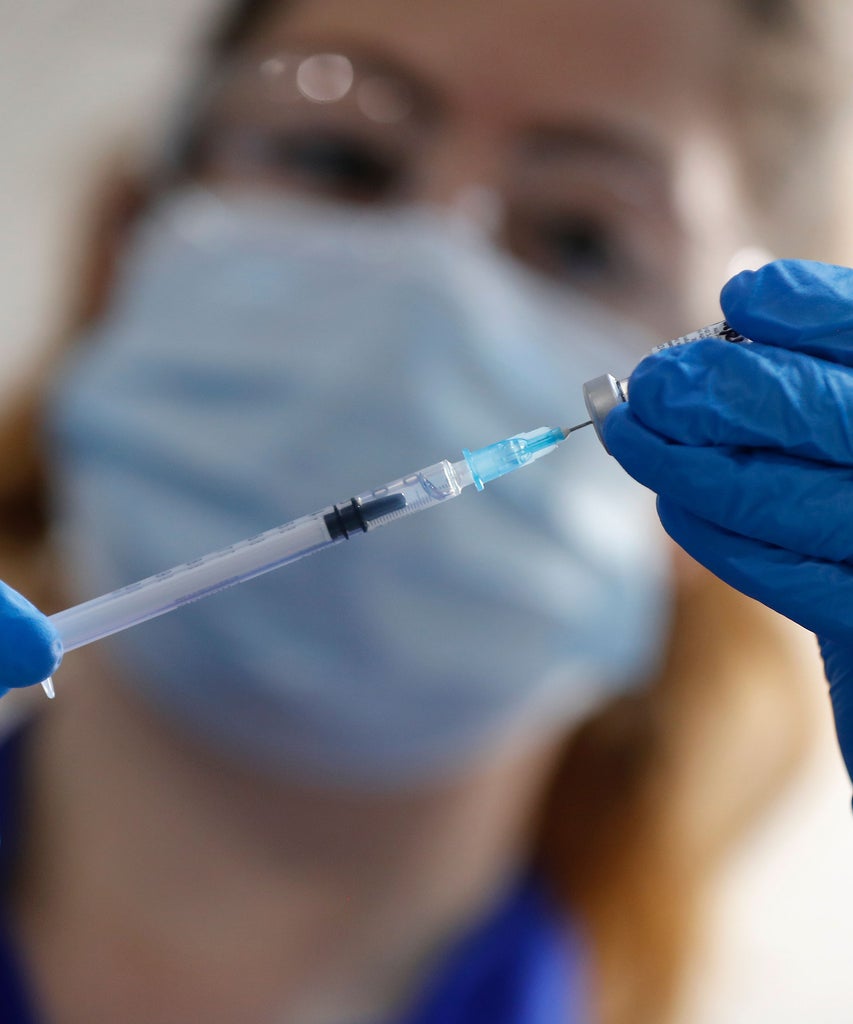
Nurse prepares a shot of the Pfizer-BioNTech COVID-19 vaccine at Guy’s Hospital in London, as the U.K. health authorities rolled out a national mass vaccination program. U.K. regulators said Wednesday Dec. 9, 2020, that people who have a “significant history” of allergic reactions shouldn’t receive the new Pfizer/BioNTech vaccine while they investigate two adverse reactions that occurred on the first day of the country’s mass vaccination program
Virus Outbreak Vaccine, London, United Kingdom – 08 Dec 2020
Among the first few thousands of people to receive the coronavirus vaccine in the United Kingdom, two National Health Service staff members with histories of allergic reactions reportedly experienced adverse symptoms after injection. Now, the Medicines and Healthcare products Regulatory Agency (MHRA) has advised anyone with a history of “significant” allergic reactions to medicines, food, or vaccines to hold off getting the Pfizer/BioNTech vaccine as a precautionary measure, until it has a chance to investigate what may have caused the allergic reaction.
According to the NHS, both staff members, who each carry epinephrine injectors, sometimes called EpiPens, for other allergies, had serious anaphylactoid reactions but recovered quickly after treatment. “Both are recovering well,” NHS Medical Director Stephen Powis told The Washington Post.
No specific symptoms were listed, but according to Mayo Clinic, an anaphylactoid reaction can occur following a first-time exposure to a substance in non-sensitised patients. Common symptoms include hives, shortness of breath, and low blood pressure. This is not the same as anaphylaxis, which can be fatal. Often, the reaction is immediate or occurs within an hour. While severe, allergic reactions can be treated with an injection of epinephrine, also known as adrenaline. The advice issued by the MHRA also states that the vaccine “should only be carried out in facilities where resuscitation measures are available.”
A spokesperson for Pfizer confirmed that British regulators had informed them of the allergic reactions, adding, “As a precautionary measure, the MHRA has issued temporary guidance to the NHS while it conducts an investigation in order to fully understand each case and its causes. Pfizer and BioNTech are supporting the MHRA in the investigation.” According to Pfizer’s trial protocol, people with a history of anaphylaxis “to any component of the study intervention” were not allowed to take part for safety reasons.
But this isn’t of too much concern, according to professionals. The U.S. Food and Drug Administration released documents on Tuesday saying that the Pfizer/BioNTech trial data had indicated a slightly increased potential for an allergic reaction in those who received the vaccine compared to those who were injected with a placebo. However, the chances are still quite small; 0.63 percent compared to 0.51 percent, respectively. “Certainly, vaccines can cause severe allergic reactions,” vaccine expert Dr. Paul Offit told CNN. “In the United States, roughly one of every 1.4 million doses of vaccines is complicated by a severe reaction.”
This was also echoed by Peter Openshaw, a professor of experimental medicine at Imperial College London who told CNN, “As with all food and medications, there is a very small chance of an allergic reaction to any vaccine. The fact that we know so soon about these two allergic reactions and that the regulator has acted on this to issue precautionary advice shows that this monitoring system is working well.”
As a common practice, the U.S. Centers of Disease Control and Prevention advise telling healthcare providers of “any severe, life-threatening allergies” before taking any vaccine, coronavirus, or otherwise. Even for an annual flu shot, people with a history of allergic reactions are encouraged to consult their doctor beforehand.
“For the general population, this does not mean that they should need to be anxious about receiving the vaccination,” Stephen Evans, a professor of pharmacology at the London School of Hygiene and Tropical Medicine told the UK’s Science Media Centre. “One has to remember that even things like marmite can cause unexpected severe allergic reactions.”
Like what you see? How about some more R29 goodness, right here?
The UK Approves The Pfizer Vaccine. What Now?